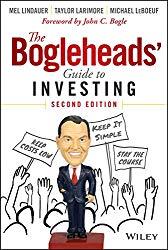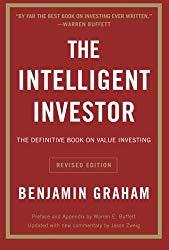“Individual stock investing? No one can beat index funds!”
We’ve all been brainwashed by the Bogleheads and others to think that individual stock investing is 1) risky, 2) difficult, and 3) not as effective as index investing. But individual stock investing can fit right in with an investing strategy and holds various advantages. Today we’ll talk about some of the reasons you may want to use individual stock investing for a portion of your portfolio.

(Note, if you click on a link in this post and buy something from Amazon (even if you buy something different from where the link takes you), The Small Investor will receive a small commission from your purchase. This costs you nothing extra and is the way that we at The Small Investor are repaid for our hard work, bringing you this great content. It is a win-win for both of us since it keeps great advice coming to you (for free) and helps put food on the table for us. If you don’t want to buy something from Amazon or buy a book, how about at least telling your friends and family about our website as a great place to learn about investing and personal finance. Thanks!)
Myth: You can not “beat the markets” by investing in individual stocks. Your chances are just too low.
We are often told that no one can get a better return than the markets, often characterized by the returns of index funds, by investing in individual stocks. This is because numerous studies have shown that the majority of professional money managers do not beat the returns of their indexes over long periods of time. If this is the case, then what chance does an individual investor have, right?
Actually, while it is true that very few professional managers will be able to beat the indexes, many individual investors can do outperform the indices over long periods of time. Why the difference? Because money managers need to invest lots of money, they need to spread their investments out over many stocks. If they just bought their favorites, they’d end up owning all of the available shares of their favorites because they have so much money to invest. In doing so, they’d drive the price of the shares of the stocks of the companies into which they were buying way up. When they sold, they’d drive prices way down. Instead, they need to buy their favorites, plus ten other stocks in the same industry.
Money managers are also constantly needing to perform
They are also under constant pressure to turn in performance. If the stock market goes up 15% and they only return 10%, a bunch of people may sell out of their fund and go to another. They also need to be holding the hot stocks each quarter so that they look like geniuses. This causes some silly behavior like trading in and out of stocks to try to improve performance and loading up on the hot stocks for the quarter, right after they’ve already gone up, only to sell out of them after the quarterly report is published. Over time, this drives up costs and hurts performance.
Individual investors don’t have these issues. They can just buy the one stock in an industry that they really like and forget the rest. They can hold onto stocks while they sit there, quarter after quarter, waiting for earnings to catch fire and lift the share price. This is a huge advantage that individual investors have over professional money managers.
Using your advantage to beat the markets.
So, what kind of investor beats the markets? Individual investors who buy stocks as investments in businesses, rather than trying to time the markets and make a quick profit based on price fluctuations, are the ones who beat the market. It is extremely difficult to know which stocks will go up or down over the next few months or even the next few years. It is comparably easier to determine which companies will see earning grow appreciably over the next several years. Choose these stocks, accepting that you won’t know what little bobbles in the economy will occur along the way or when the market will see what you see and bid up the price of your stock. Just know that if the company continues to perform, and you continue to hold on, your investment will eventually be rewarded.
Your goal is therefore to find companies that are well-managed, profitable, and growing. Once you find them, you load up on them, buying in when you have cash and when opportunities present themselves until you have a relatively large stake in them. After that, you just wait. So long as the company continues to perform well and earnings continue to grow, you hold on. That’s it.
Characteristics of great companies
Because you’re looking for companies that will grow over time, as opposed to companies that grow and shrink with the economy or just sit there, year after year, these are the characteristics to look for:
- Growing earnings (on the order of 10-20% per year) with earning increasing every year for five years or more
- Relatively low debt (zero is great)
- A return on equity (ROE) of 15-25% (this shows how well the company is managed)
- A leader in the market (you want the brand name in the market, not the generic)
- Room for growth (find stocks before they’re on every corner)
Tax advantages of individual stocks
One of the biggest benefits of individual stock buying is the ability to control your taxes. Individual stocks are only taxed on dividends and when you sell at a profit. Hold a stock with no dividend indefinitely and you’ll not pay any taxes even though the value of your position may be increasing. But wait, it gets better.
If you sell a stock at a gain, you can sell another stock at a loss and offset the gain. For example, if you sell 100 shares of XYZ and make a $10,000 gain, but then sell 500 shares of ABC for a $9,000 loss, you’ll only owe taxes on $1000. You can even deduct up to $3000 in stock losses against your regular salary income!
Learning more about investing
I really can’t teach you everything in a 1500 word blog article. Luckily, I wrote the book on investing! You can learn a lot more about investing from The SmallIvy Book of Investing. You can pick up a copy from Amazon by clicking on the image below. Other suggested titles for new investors are shown below.

Want all the details on using Investing to grow financially Independent? Try The SmallIvy Book of Investing.
Other great books for learning investing:

Have a burning investing question you’d like answered? Please send to[email protected] or leave in a comment.
Follow on Twitter to get news about new articles. @SmallIvy_SI
Disclaimer: This blog is not meant to give financial planning or tax advice. It gives general information on investment strategy, picking stocks, and generally managing money to build wealth. It is not a solicitation to buy or sell stocks or any security. Financial planning advice should be sought from a certified financial planner, which the author is not. Tax advice should be sought from a CPA. All investments involve risk and the reader as urged to consider risks carefully and seek the advice of experts if needed before investing.
